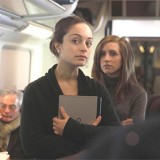This short film is part of “Per Fiducia” (“Through Trust”), an ambitious project that unites three award-winning directors Ermanno Olmi, Gabriele Salvatores, and Paolo Sorrentino in cooperation with Intessa Sanpaolo – to answer a simple, yet timely question:
Can movies, as mirrors to reality, change it and give hope, especially in dark moments?
The answer is resounding yes, but “Per Fiducia” (“Through Trust”), a spirit-lifting project that with its three films wants to show the positive values that animates and drives Italy today.
When you think of all the myriad of phenomena we take for granted such as legal contracts, airport baggage checks, surveillance cameras, keys, borders and so on – these are all elements that were invented as a result of a slight “bug” in the human brain that sometimes takes over: the need to “game” the system at the expense of others.
And since most people got hit too many times, the issue of trust has become a well-regarded currency you share with just a few people you absolutely know and have established relationships with. Your best friend asks you can you lend me your car this evening I have an important date? Sure thing! Coming from a stranger – no way!
 Maral Kinran and Stefania Berselli in a moment of uncertainty
Maral Kinran and Stefania Berselli in a moment of uncertainty
In this film, director Ermanno Olmi returns to a familiar environment he has already explored in Tickets (Ermanno Olmi, Abbas Kiarostami, Ken Loach – 2005) – the train. The film tells the story of 3 teenagers that ride the train after winning first prize in a science technology contest for a smart, yet fashionable bracelet designed for kids with diabetes.
The contest is over, the temporary rush of winning was great, but what next? The prototype still needs money in order to turn it into a real product. Matteo (Matteo Bessone) ponders deeply this question. His partners, Stefania (Stefania Berselli) and Maral (Maral Kinran) reflect on this as well, as their faces are reflected in the window, superimposed over the moving landscape. Where are we headed? What’s in store for us when we get there?
Trains have been used in many films to portray life line itself. We’re all passengers who share the same train for just a short while. The movement forward indicates the passing time towards an unknown future, where the stations may signify milestones or opportunities along the way.
The chance encounter of the teenagers with the important professor (Maurizio Marchetti), on the train, initially plays out the common distrusts we come across when facing with sudden requests from complete strangers.
In this case, I liked the utter silence that came out from the professor’s collaborator (Marco Constantini). This is Olmi’s at his best. The person who speaks (professor) and shapes the reality is minor to the facial expressions of those that surround him, in this case the collaborator – that processes the verbal exchange and without saying a word, projects an utter distrust. Less is so much more.
The soundtrack with its grand entrance-feel of trumpets keeps reminding us of new beginnings; new ideas by young generations that take place everywhere. They may be delayed here and there due to some temporary setbacks, but they will finally arrive and make their mark.
The film’s universal message is loud and clear. Despite human innate suspicion due to the above described “bug” and occasional superficiality (enter Susan Boyle case), sprinkling a bit of trust around us can go a long way for a far better world.
Try it next time, you’re faced with the instinctive urge to dismiss something as distrustful and not help.
You can view the entire film below (10:15 minutes), and with English subtitles – here:
[youtube width=”615″ height=”461″]http://youtu.be/YQNdho_nR8E[/youtube]


i found this item on new italian cinema from strickly film school
http://filmref.com/journal/archives/open_roads_new_italian_cinema/
Interesting. Thanks.